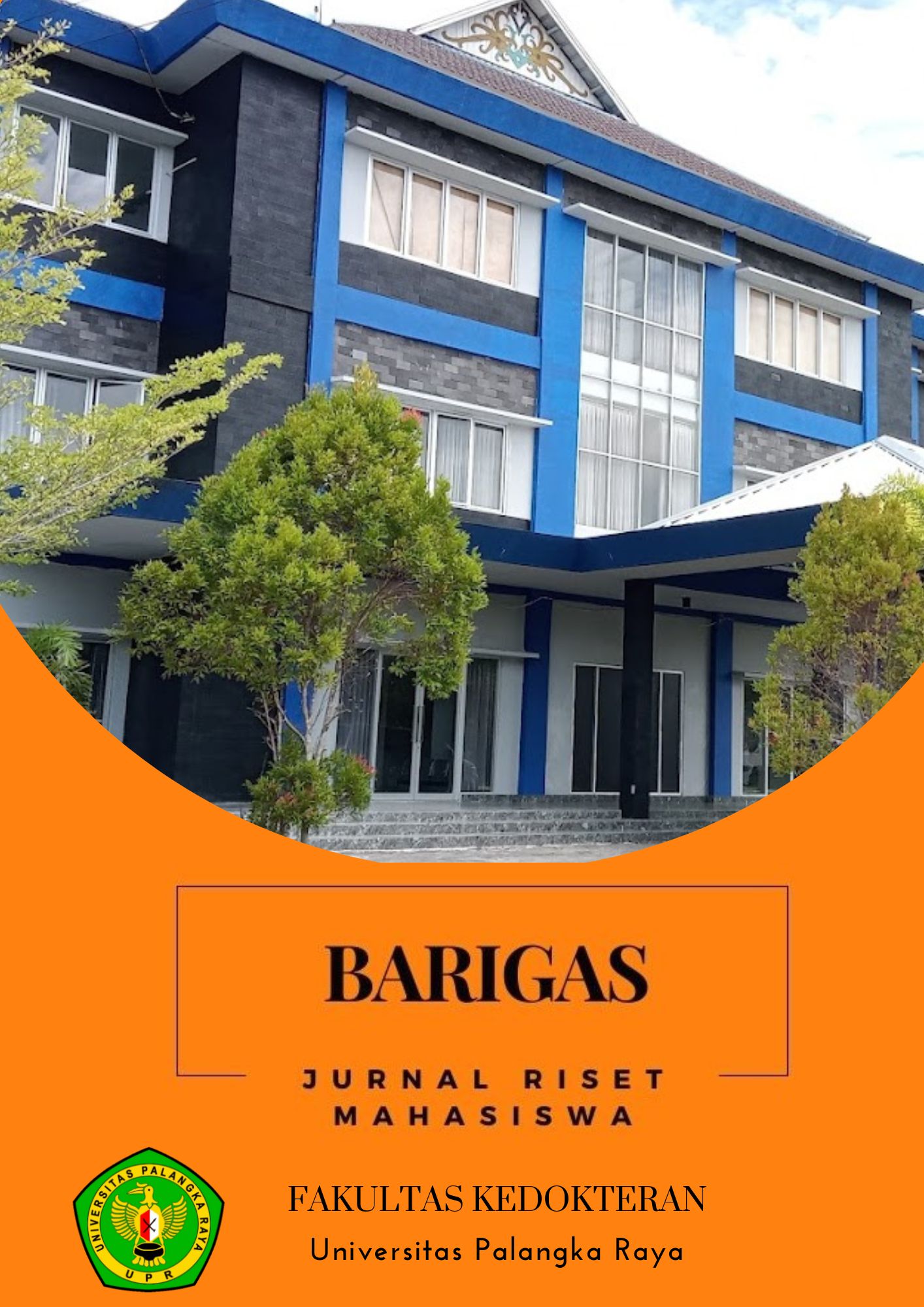Korelasi kadar bikarbonat dengan QSOFA score pada pasien sepsis di RSUD dr. Doris Sylvanus
DOI:
https://doi.org/10.37304/barigas.v2i3.11665Keywords:
Violence Prevention, Child, PsychologicalAbstract
Sepsis is a life-threatening medical emergency due to organ dysfunction described by the body's systemic immunological response to an infectious reaction. Sepsis patients experience sequential system failure, leading to multiple organ failure Sepsis sufferers experience organ failure will experience metabolic acidosis. An indicator of metabolic acidosis is a decrease in bicarbonate. qSOFA is required to determine the risk of organ failure in sepsis patients. To analyze the correlation of bicarbonate levels with qSOFA score in sepsis patients. The relationship between bicarbonate levels and qSOFA was tested using the Pearson correlation. There was no statistically significant with p value = 0.099 and r value = -0.307. Conclusion: There is no significant relationship between bicarbonate levels and qSOFA scores in sepsis patients at RSUD dr. Doris Sylvanus, there is a low correlation intensity with a negative correlation direction, indicating higher bicarbonate levels, lower qSOFA scores.
Downloads
References
Gyawali B, Ramakrishna K, Dhamoon AS. Sepsis: The evolution in definition, pathophysiology, and management. SAGE Open Med. 2019;7:205031211983504.
Septimus EJ. Sepsis perspective 2020. J Infect Dis. 2020;222(Suppl 2):S71–3.
Suprayogi E, Sudarsono, Harijanto E. Sepsis dengan Disfungsi Multi Organ. J Anesth Crit Care. 2018;36(1):9–18. Available from: https://journal.perdatin.org/index.php/macc/article/download/105/68
Suetrong B, Walley KR. Lactic acidosis in sepsis: It’s Not All anaerobic: Implications for diagnosis and management. Chest [Internet]. 2016;149(1):252–61. Available from: http://dx.doi.org/10.1378/chest.15-1703
Hökenek NM, Seyhan AU, Erdoğan MÖ, Tekyol D, Yılmaz E, Korkut S. Evaluation of Blood Gas Analysis as a Mortality Predictor. 2019;30(2017):228–31.
Samanta S, Singh RK, Baronia AK, Mishra P, Poddar B, Azim A, et al. Early pH Change Predicts Intensive Care Unit Mortality. 2018;(17):697–705.
Nasa P, Juneja D, Singh O, Dang R, Arora V. Severe sepsis and its impact on outcome in elderly and very elderly patients admitted in intensive care unit. J Intensive Care Med. 2012;27(3):179–83.
Lestari DA, Wijaya V, Kuncoro H. Karakteristik dan Penggunaan Antibiotik Pasien Sepsis di Rumah Sakit Abdul Wahab Sjahranie Periode 2017. Proceeding Mulawarman Pharm Conf. 2018;7:1–7.
Dharmawan A, Istia MJ, Tan HT, Suparto S, Anastasia MC, Layanto N. The Outcome of Patients with Sepsis at Tarakan Hospital Central Jakarta in 2018. Muhammadiyah Med J. 2021;2(2):49.
Vivianni A, Farhanah N. Faktor  Faktor Prediktor Mortalitas Sepsis Dan Syok Sepsis Di Icu Rsup Dr Kariadi. Diponegoro Med J (Jurnal Kedokt Diponegoro). 2016;5(4):504
Xu J, Tong L, Yao J, Guo Z, Lui KY, Hu X, et al. Association of Sex with Clinical Outcome in Critically Ill Sepsis Patients: A Retrospective Analysis of the Large Clinical Database MIMIC-III. Shock. 2019;52(2):146–51.
Yessica P. Faktor Risiko Sepsis Pada Pasien Dewasa. J Media Med Muda. 2014;
Dias SP, Brouwer MC, Van De Beek D. Sex and Gender Differences in Bacterial Infections. Infect Immun. 2022;90(10).
Tameru RP, Supraptomo R, Setijanto E. Comparison between SIRS and qSOFA Score for Predicting Mortality and Length of Stay Sepsis Patients in ICU of Dr Moewardi Hospital Surakarta. Smart Med J. 2022;5(1):22.
Proffitt RD, Hooper G. Evaluation of the (qSOFA) Tool in the Emergency Department Setting: Nurse Perception and the Impact on Patient Care. Adv Emerg Nurs J. 2020;42(1):54–62.
Kreü S, Jazrawi A, Miller J, Baigi A, Chew M. Alkalosis in critically ill patients with severe sepsis and septic shock. PLoS One. 2017;12(1):1–10.
Sohn YW, Jang HY, Park S, Lee Y, Cho YS, Park J, et al. Validation of quick sequential organ failure assessment score for poor outcome prediction among emergency department patients with suspected infection. Clin Exp Emerg Med. 2019;6(4):314–20.
Efrida E, Parwati I, Redjeki IS. Pendekatan Stewart Dalam Ph Darah Yang Mendasari Asidosis Metabolik. Indones J Clin Pathol Med Lab. 2018;19(2):79–87.
Liu Z, Meng Z, Li Y, Zhao J, Wu S, Gou S, et al. Prognostic accuracy of the serum lactate level, the SOFA score and the qSOFA score for mortality among adults with Sepsis. Scand J Trauma Resusc Emerg Med. 2019;27(1):1–10.
Hargovan S, Gunnarsson R, Carter A, De Costa A, Brooks J, Groch T, et al. The 4-Hour Cairns Sepsis Model: A novel approach to predicting sepsis mortality at intensive care unit admission. Aust Crit Care.. 2021;34(6):552–60. Available from: https://doi.org/10.1016/j.aucc.2020.12.007
Downloads
Published
How to Cite
Issue
Section
License
Copyright (c) 2024 Barigas: Jurnal Riset Mahasiswa

This work is licensed under a Creative Commons Attribution-NonCommercial-ShareAlike 4.0 International License.











